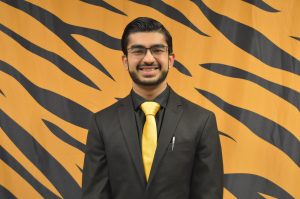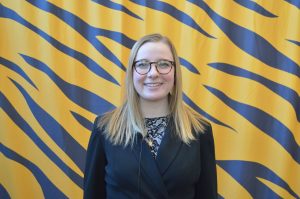Each year, the Mizzou Alumni Association Student Board selects 39 outstanding seniors for its annual Mizzou ‘39 Award. Mizzou ‘39 recipients are chosen for their academic achievement, leadership and service to Mizzou and the community. In the spirit of service that was the cornerstone of the 1839 founding of the University of Missouri, the award is presented each spring.
This year, the MU College of Agriculture, Food and Natural Resources had four students receive the Mizzou ‘39 Award, two within the Department of Biochemistry – Devesh Kumar and Michaela Thomson.
Devesh Kumar
As a Columbia native, Kumar knew all that the University of Missouri had to offer. While he did take his time before choosing MU, it was an obvious choice at the end of the day.
“I was always aware of the education that students receive here at Mizzou,” Kumar said. “When I was deciding between schools to determine where I wanted to receive my higher education, Mizzou always stood out to me – and I was amazed at the optimistic attitude present on campus. I consider choosing MU to be one of the best decisions of my life.”
Kumar picked biochemistry as his major after enjoying a high school course related to biochemical techniques. He found a passion for the program as he got more involved.
“I really liked that course and learned a lot,” Kumar said. “Biochemistry aligned most with what I wanted to do, and I gave it a shot. After my freshman year, I fell in love with the program and decided to continue with it.”
Throughout Kumar’s time at Mizzou, he earned numerous valuable experiences, including building multiple friendships. Kumar is part of Soka: Buddhists for Peace, an organization that is geared toward achieving world peace by tapping into the inherent highest potential in each individual. He said his involvement in this organization made a significant impact on his life by cultivating a sense of compassion and courage.

“One of the reasons that I have so much gratitude for Mizzou is that I have met amazing friends who care deeply and are willing to be there and help me out no matter what,” he said. “I consider these to be my life-long friends. Some of my favorite memories on campus are being united and hosting meetings for Soka. This organization made Mizzou a home for me and I am forever grateful.
“Additionally, I have had a great time in my biochemistry labs, where the environment is so inclusive as we dive deep into rigorous biochemistry coursework.”
Kumar said he is thankful for the skills he has been able to learn through his biochemistry courses and labs, skills that will be vital as he joins the workforce in the future. He found it was very important to reach out whenever he had questions or needed help as well.
“CAFNR has taught met the skills I need for the future,” Kumar said. “The courses and the labs in the biochemistry department have allowed me to think critically and analyze information without leaving a stone unturned. Additionally, CAFNR has allowed me to develop my interpersonal skills, which I am very happy about as well.
“Also, irrespective of your major, one of the biggest differences between college and high school is that in high school, you have teachers constantly holding your hand. In college, you are on your own and have the freedom to make your own decisions. It’s incredibly important to not fall behind – and reach out for help if you need it. There are amazing resources on campus, such as the counseling center, the student success center and the writing center that are all more than happy to assist you in any way they can.”
The Mizzou ’39 Award was a major highlight for Kumar as he finishes his bachelor’s degree. He said it was a great way for him to end his final semester.
“I am ecstatic to receive the Mizzou ’39 Award, as I had heard about this honor but didn’t know whether I would be qualified for it,” Kumar said. “I have been fortunate to come to Mizzou and be a part of CAFNR, and with all the support I have received from my peers and faculty, I was honored to be recognized. I consider this award not just a win for me, but a win for all CAFNR students, a win for all biochemistry majors and a win for all pre-med students.”
Michaela Thomson
Mizzou was an attractive destination for Thomson as she making her decision on where to begin her secondary education. Thomson, who is from Jefferson City, Mo., was looking for a place where she could find multiple opportunities to grow. MU offered the perfect environment.
“I loved the idea of attending a large university where I would have plenty of involvement opportunities, research experiences, interactions with people different from myself and a chance to participate in all Mizzou has to offer,” Thomson said. “I wanted to study biochemistry because I want to go to medical school, and I felt like a degree in biochemistry would properly prepare me for the rigors of medical school and show that I am a competitive student. I’m so glad I chose biochemistry because it is a small major where I know everyone in my classes, and I feel supported by professors and the CAFNR staff and faculty.”

Thomson added that she would forever be grateful to those CAFNR faculty and staff, who helped prepare her as she transitions to a future career centered on medicine.
“I feel CAFNR has prepared me well for my future career in medicine,” she said. “There are so many support programs and staff that have been there to help me along the way. As a CAFNR student, I feel like the faculty and staff really care about my success and are always available to help.”
One of Thomson’s favorite activities during her time at MU was Summer Welcome, for which she served as a leader. Summer Welcome is a two-day orientation where newly admitted students gather essential information about the next step in their transition to college life.
Thomson also served as the Department of Student Activities Speakers Chair during her time at MU.
“One of my favorite memories/traditions at Mizzou was jumping in the fountain each night with my Summer Welcome groups,” Thomson said. “Being a mentor to each of my Summer Welcome students, as well as passing on knowledge and being an advocate was such an amazing experience. Jumping in the fountain with them was a way of welcoming them to Mizzou and all of the traditions and opportunities that make MU truly so unique.”
Working with the admitted students and freshmen was a passion for Thomson, who said her advice to new Mizzou students was to find their passions while in college.
“I always tell incoming students to cultivate their passions,” Thomson said. “Discovering what you are passionate about and pursing those passions is a long process, but worth it in the end. Whether your passion is service, research, leadership or any other opportunity on campus, there is something for everyone. Work on discovering yourself and cultivating what interests you and you’ll find its so rewarding to give back.”
The Mizzou ’39 Award wasn’t the only honor Thomson received during her senior year. She was part of the 2019 Homecoming royalty court, as one of the five queen candidates.
Thomson added that the Mizzou ’39 Award process was enjoyable, as she was able to reflect on the past four years and what they’ve meant to her.
“I was honored to be selected as a Mizzou ‘39 recipient,” she said. “I feel so fortunate to be recognized alongside 38 other incredible campus leaders. Mizzou ’39 was an incredible experience and it was so rewarding to be recognized for my work and dedication over the last four years. The process of applying and interviewing was very reflective, I was able to fully appreciate all the different organizations I had worked with and how I contributed to change in those organizations. I love that many students from all parts of campus are recognized for their accomplishments in different areas, and Mizzou ’39 is a great showcase of how students have changed MU for the better.”